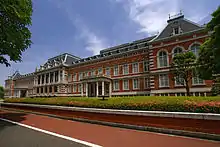Ministry of Justice (Japan)
The Ministry of Justice (法務省, Hōmu-shō) is one of the cabinet level ministries of the Japanese government. It is responsible for the judicial system, correctional services, and household, property and corporate registrations. It also serves as the government's legal representatives.
| 法務省 Hōmu-shō | |
 The Ministry of Justice building | |
| Agency overview | |
|---|---|
| Formed | February 15, 1948 |
| Preceding agency |
|
| Jurisdiction | |
| Headquarters | 1-1-1 Kasumigaseki, Chiyoda-ku, Tokyo, Japan |
| Ministers responsible |
|
| Parent agency | Government of Japan |
| Website | http://www.moj.go.jp |
At the top of the ministry is the Minister of Justice, a member of the Cabinet, who is chosen by the Prime Minister from among members of the National Diet.
History
The Ministry of Justice was established in 1871 as the Ministry of Justice (司法省, Shihōshō). It acquired its present name under the post-war Constitution of Japan in 1952. Its responsibilities include administration of Japan's judicial system and the penal system. It represents the Japanese government in litigation, and is also responsible for maintaining the official registers of households, resident aliens, real estate and corporations.
Structure
The Ministry has jurisdiction over the National Bar Examination Commission, the Public Security Examination Commission, and the Public Security Intelligence Agency. Although the Public Prosecutors Office are administratively part of the Ministry of Justice, they are independent of the authority of the Minister of Justice. The Ministry also oversees the Immigration Services Agency.[1]
See also
References
- Kenkyusha's New Japanese–English Dictionary, Kenkyusha Limited, Tokyo 1991, ISBN 4-7674-2015-6
Footnotes
- "Bureau head Shoko Sasaki to lead upgraded Immigration Agency when it launches April 1". March 28, 2019 – via Japan Times Online.
External links
| Wikimedia Commons has media related to Ministry of Justice (State of Japan). |
- Official website (in English)
- Official website (in Japanese)
- Japanese Law Translation, Law/Term/context search site


